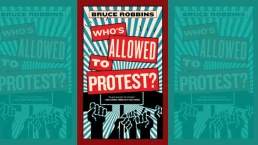To me, thanks to the absurdity of our Electoral College system, how progressives should vote depends on the state where they’re going to vote.
By Henry Norr
Most of my friends and online acquaintances, as well as the progressive pundits I read or hear in the media, insist everyone must vote for Kamala Harris because Trump is so terrible. A smaller group – mostly Palestine-solidarity activists and people who have worked with third parties in the past – says “No way!” Everyone who’s truly progressive, they argue, should refuse to back an establishment candidate like Harris, in particular because of her support for Israeli genocide, and should instead vote for a third-party radical, most often Green Party candidate Jill Stein.

I understand the concerns of both groups, but I agree with neither. To me, thanks to the absurdity of our Electoral College system, how progressives should vote depends on the state where they’re going to vote. If you live in what’s known as a “swing state” – one of the seven states (Arizona, Georgia, Michigan, Nevada, North Carolina, Pennsylvania, and Wisconsin) where recent polling and past presidential election results suggest either Trump or Harris could win – I say hold your nose and vote for Harris.
If, on the other hand, you’re a progressive in a state that’s solidly “blue” or “red” – that is, the 43 states, plus Washington, D.C., where the polls and history indicate that either the Republican or the Democrat is sure to win – I see no reason to vote for Harris. Voting for her in such a state wouldn’t in any way help ward off the threat of a second Trump term, because one or the other of them is going to win and get all of that state’s Electoral College votes no matter how you vote. Voting for a genuine progressive – Jill Stein, who’s on the ballot in 37 states, or Cornel West, who’s listed in 15 states – will keep your conscience clear, because you won’t have voted for genocide, fracking, increased military spending, and all the other terrible elements of the Democratic program. More importantly, it will send a message to Harris and her party that they can’t count on your vote just because they haven’t moved quite as far to the right as the Republicans.
(In some states there are other third-party candidates on the ballot and/or an option to write in someone or something. My objection to those options is that no media and therefore no one else is likely even to notice how many voters chose them, so doing so will have no real political effect.)
My friends who argue for voting for a third-party wherever you vote, even in states so closely divided that such votes could conceivably tip the outcome to Trump, say, in essence, that it doesn’t matter because both candidates really stand for the interests of American capitalism, with its grotesque economic inequality, unconscionable poverty, desperate shortage of housing, ever-increasing military spending, continued expansion of fossil-fuel production, mass incarceration, ever-tighter restrictions on immigration, and an imperial foreign policy, including support for apartheid Israel, its genocidal onslaught in Gaza and now Lebanon, and its seeming determination to provoke a larger war with Iran.
I agree with those criticisms. Nothing in Harris’s speeches, interviews, or political history suggests she will fight for, or even propose, major change in any of those areas. In particular, she’s clearly a militarist and a Zionist: there’s no reason to think she’d try to change U.S. foreign policy, cut military spending, or – despite occasional vacuous expressions of regret about civilian deaths in Gaza – stop arming and funding Israel, however murderous its behavior. On the issue of climate, she, like Obama and Biden before her, supports an “all of the above” approach: more renewable energy, but also more fossil-fuel extraction, without acknowledging that renewables do nothing to slow the unfolding climate catastrophe as long as we continue to burn fossil fuels. And on migration, she constantly promotes the “bi-partisan” bill Biden backed, which essentially endorsed the Republican approach to the issue.
That adds up to a good case not to support Harris. On some issues, though, Trump’s platform is even worse, dramatically so, and those issues are significant enough to make me hope she wins, and that means I hope progressives in those states will vote for her. To cite just a few of those issues, Harris supports women’s reproductive rights, while Trump, whatever his private personal views, is clearly committed to restricting those rights, even beyond what his first-term appointees to the Supreme Court did in overturning Roe v. Wade. Harris is no friend of desperate immigrants seeking asylum in the U.S. – and now, according to running-mate Tim Walz, she’s reversed herself and decided undocumented people already here shouldn’t be eligible for government health care or even driver’s licenses, but she’s unlikely to attempt a military roundup and deportation of the 11 million undocumented, as Trump has promised, or to impose a “Muslim travel ban,” as Trump did in 2017 and promises to re-enact, in stricter form, if he’s re-elected.
Harris made her name as a prosecutor and by her own admission remains a “law-and-order” candidate, but I doubt she’d call out the National Guard or even the U.S. Army to suppress protest demonstrations – or at least not as often as Trump says he would. When it comes to judicial appointments, she would presumably nominate so-called “moderates,” whereas Trump would almost certainly continue his first-term practice of choosing only candidates pre-approved by the far-right Federalist Society.
As to climate and the environment, even though Harris wants to see continued expansion of fossil-fuel extraction, including more fracking, in addition to more renewables, she probably won’t go to the extremes “Drill, baby, drill” Trump has promised his oil- and gas-industry donors, such as reversing the Biden administration’s restrictions on drilling in the Arctic and the Gulf of Mexico and limiting sales of electric vehicles.
Like Obama and Biden, Harris is committed to preserving and in some modest ways even extending the limited social safety net created by the New Deal, the Great Society, and Obamacare, as well as the grossly inadequate but better-than-nothing protections offered by such administrative agencies as the National Labor Relations Board, the Environmental Protection Agency, and the Occupational Health and Safety Administration.
Trump, on the other hand, aims to gut all that, as demonstrated in remarkable – and chilling – detail in Project 2025, the far-right Heritage Foundation’s 922-page policy blueprint for the next Republican president. Trump now tries to distance himself from this frightening document, but it was drawn up mostly by former members of his administration. If elected, he might not seek to implement every last bit of it, and it’s so extreme that even some Republicans might balk at parts of it. But the team behind Trump today is, by all accounts, far more unified, disciplined, and competent than his first administration. If they manage, by legislation or executive action, to push through even a fraction of what the document proposes, it could mean drastic changes – for the worse – in the lives of Americans.
Finally, there’s the broader question of what a Trump victory would mean for this nation’s – and perhaps the world’s – political culture. He has already succeeded in giving racism, misogyny, xenophobia, religious bigotry, and just plain meanness a new coat of pseudo-legitimacy among a surprisingly (to me) large section of the American public. A victory for him in November would only reinforce these trends. Whatever you call this ideological complex – Christian nationalism? proto-fascism? actual fascism? – they’re scary.
So that’s why I hope Harris wins. (And I can’t help wonder what part of the above analysis my they’re-both-the-same friends reject.) If the U.S. elected its presidents the democratic way – by national majority vote – it’d be enough to make me too hold my nose and vote for her. Where House and Senate seats are up for grabs, as well as in state and local races, I’d apply the same logic. I trust most progressives in swing states will make the same choice – I hope they all do. Sure, it means casting your lot for the lesser evil, but if the only realistic alternative in this election is a significantly greater evil, why not choose the lesser one?
But I live in California, a state Harris is certain to win, with or without the votes of genuine progressives. Thanks to our outrageously undemocratic Electoral College system, that means she will get all of this state’s electoral votes, and my voting for her would do nothing whatsoever to forestall a Trump victory. But by voting for Jill Stein, I can at least send a message to Harris and her party that they won’t get my vote as long as they continue their present policies, in particular their refusal to take action to eliminate fossil fuels, slash military spending, and, most urgently this year, stop Israeli genocide.
Will it do any good? Not if only a few of us do it. But if everyone who doesn’t live in a swing state and shares my disgust with the Democrats were to vote for Jill Stein or, if you prefer, Cornel West, maybe Harris and her successors would feel obliged to throw us a few bones before the next election. That’s a long shot, to be sure, but what good is a vote for Harris going to do?
Henry Norr is a longtime activist and retired journalist. Having never lived in a swing state, he has voted for only one Democratic presidential candidate, George McGovern n 1972.
Recent Posts
Everyone Is Allowed To Protest
February 13, 2026
Take Action Now Tied up with the apparently very longstanding tradition of claiming that all opponents of atrocities are purely engaged in what has…
Abolition Is Still The Only Way Out Of This
February 13, 2026
Take Action Now Forget the useless so-called “reforms” to ICE and policing currently on offer. We need much more fundamental change.By Andrea J.…
Leading Papers Call For Destroying Iran To Save It
February 11, 2026
Take Action Now The opinion pages of the New York Times and Washington Post are offering facile humanitarian arguments for the US to escalate its…
Despite Marco Rubio’s Warnings, This is the Time to Go to Cuba in Solidarity Against the Latest U.S. Aggressions
February 10, 2026
Take Action Now When visiting Cuba, one can see quickly the terrible effects of the almost seven decades of the U.S. economic blockade of Cuba.By…




